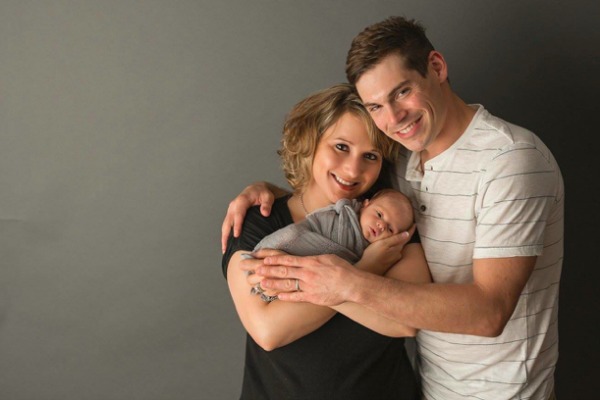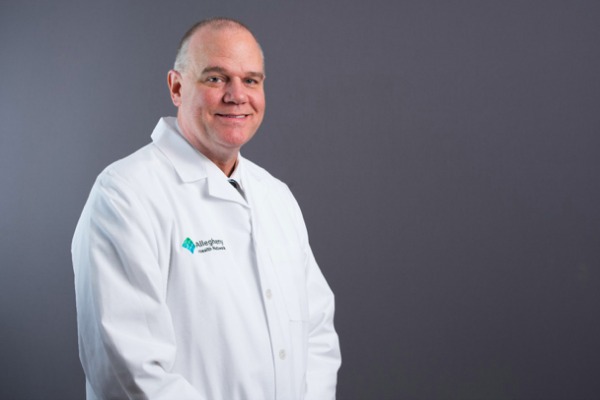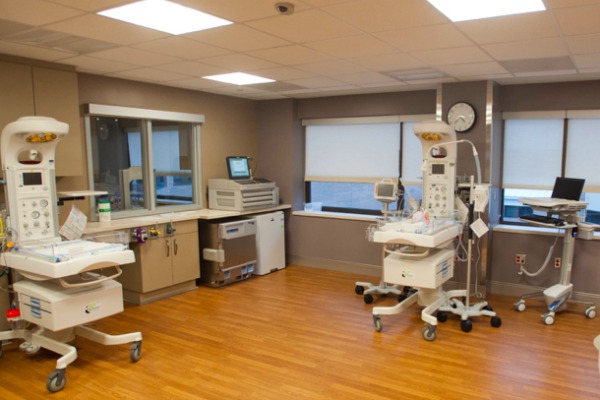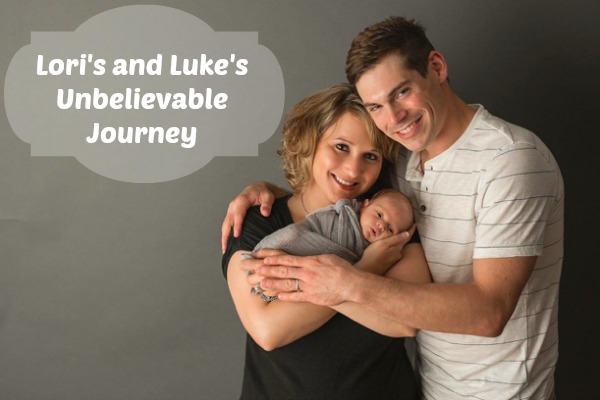NICU at AHN’s Jefferson Hospital Gives Reassurance to Caregiver Turned Patient

Lori Henkel couldn’t have been happier.
It was spring 2016. She and her husband, Matt, were expecting their first child, a son, Luke. Lori was more than halfway through her pregnancy.
“Everything was going great. Totally normal,” she said. “Then, my blood pressure started to go up a bit around 29 weeks.”
Her blood pressure was only slightly elevated, a condition known as gestational induced hypertension. Lori’s OB-GYN, Dr. David J. Deitrick at Allegheny Health Network’s (AHN) Jefferson Hospital in Pittsburgh, monitored her closely.

By 34 weeks, though, her condition had worsened. Lori was diagnosed with preeclampsia, which affects 5 to 8 percent of expectant mothers.
“I had to be tested regularly, like getting non-stress tests twice weekly, blood work weekly, and regular blood pressure checks,” she said. “I was still feeling okay at that point and wasn’t too worried because I knew that I was in excellent hands.”
Women who don’t have severe preeclampsia typically are monitored closely until they reach 37 weeks, allowing their babies to more fully develop. Then, doctors will plan for delivery after 37 weeks to avoid prolonged health risks to mom and baby.
“That was the plan,” Lori said. “So we knew that Luke would be arriving a little early.”
Thankfully, Jefferson Hospital has a Level II Neonatal Intensive Care Unit (NICU) adjoining its state-of-the-art birthing center.
Lori took comfort in knowing the NICU was there if Luke needed it. But she never imagined the unbelievable journey that awaited them.
A safety net for moms and babies
About one in every 10 infants in the U.S. is born prematurely. Last year, Jefferson Hospital admitted 99 preemies to its NICU – or roughly eight per month.

The three-bed unit has the latest equipment to care for preemies. That includes high-tech incubators that warm babies and guard them from germs, and advanced monitors that track their heart rate, blood pressure, and even brain waves.
“Jefferson can deliver babies at any stage in their development, and we’ve seen some very tiny preemies,” said Dr. Kara Gardner, a neonatologist and the NICU’s medical director. “To stay in our NICU for any length of time, though, they must be more than 32 weeks along and weigh at least 1,500 grams, which is a little over three pounds.”
A neonatal certified registered nurse practitioner staffs the unit around the clock. And an AHN neonatologist is available 24/7.
Jefferson has a Level II NICU, which means it can capably handle routine neonatal care.
“But if babies are having a lot of trouble breathing, seem to be getting sicker, or need a specialist, like a heart doctor, we will transfer them to West Penn Hospital,” Dr. Gardner said. “It’s just a 10- or 15-minute helicopter ride away.”

AHN’s West Penn Hospital in Pittsburgh has a higher-level NICU — Level III — which can care for the most fragile babies who need highly specialized care and extended time to grow and develop. What’s more, West Penn’s NICU doctors and nurses travel to see babies on-site at Jefferson.
“So babies at Jefferson are getting a high level of care from doctors and nurses who have years of experience in a Level III NICU environment,” Dr. Gardner said. “I think that gives families peace of mind.”
That expertise was something that Lori, unlike most mothers, got to see in action long before she and Luke became patients at Jefferson.
A life-saving decision
Lori is a physician assistant in Jefferson’s birthing center, so she works very closely with the hospital’s NICU staff, day in and day out.
“From the birthing center to the NICU, we all work as one team,” she said. “So I knew Luke and I were in very capable hands.”
That was all the more important as Lori advanced through her pregnancy.
Dr. Deitrick had arranged for her to have an ultrasound the day after her preeclampsia diagnosis. The scan showed another cause for concern: Lori had intrauterine growth restriction.
“So along with monitoring the preeclampsia, we now had to keep a very close eye on Luke and see how well he was growing,” she said. “It definitely added to the stress.”
Three days later, she visited Dr. Deitrick for a checkup.
“My blood pressure was fine in the morning and I had stable lab results in the afternoon,” Lori said. “At that point, we thought we were going to make it to our goal of 37 weeks.”

Thinking her condition was stable, Lori headed home. But within a few hours, everything began to change.
Around 5:30 p.m., Lori started having stomach pain. By 7:30 p.m., the pain had become severe.
“I thought maybe it was from something I had eaten,” Lori said. “Knowing the worsening symptoms of preeclampsia, I talked to Dr. Deitrick and he insisted that I get to Jefferson right away for repeat lab work.”
It was a decision that may have saved her life — and Luke’s.
An even earlier arrival
At the hospital, just six hours after having stable lab results, Lori had extremely high blood pressure. The repeat blood work showed that her liver wasn’t functioning normally, and her blood platelet count was getting dangerously low.
“In a very short time, I had developed what’s known as HELLP syndrome,” Lori said.
HELLP is a rare condition, occurring in less than 1 percent of pregnancies. It can lead to bleeding, liver rupture, kidney failure, stroke, or even death.
Dr. Deitrick wasted no time. He notified the labor and delivery staff to prepare for a C-section. Lori was rushed to Jefferson’s birthing center.
Luke would be arriving much earlier than expected — nearly six weeks early. Lori knew he’d be headed straight for the NICU.
Some 90 minutes later, at 10:55 p.m. on June 6, 2016, a three-pound, nine-ounce Luke entered the world.
“He came out screaming and didn’t need help breathing,” said Lori, who had been getting steroid injections to help Luke’s lungs develop. “He was a little fighter.”

Time well-spent
Luke spent 18 days in Jefferson’s NICU, giving him time to gain strength, develop, and grow.
Lori stayed at Jefferson four days, healing from her surgery and being monitored closely. The symptoms of HELLP gradually subsided. And her blood pressure returned to normal.
She visited Luke around the clock and pumped breast milk to bottle feed him. He was too small and didn’t have the energy to breast feed only.
“I was pushing myself and going to the NICU for every feed,” Lori said. “But the NICU staff said, ‘You just had major surgery. You have to take care of yourself, too. You get some sleep and we’ll feed him.’ They took great care of him for me.”
Even after Lori went home, she and Matt visited Luke at Jefferson every day. They saw their son growing stronger by the day. And he was gaining weight.
“The care he got in the NICU was absolutely fantastic,” said Lori, who wrote a letter of thanks to her co-workers after Luke went home. “I had all the confidence in the world delivering here, even knowing he was going to be a preemie.”
At last, on June 24, 2016, she and Matt were able to take their son home.
“That was just an amazing feeling,” Lori said. “I think the transition to home was a little easier because he had a lengthy stay in the NICU. And we had time to prepare emotionally and get to know him before bringing him home.”

Luke is now 2 years old and still growing. He’s small for his age. But he’s healthy, happy, and doing well.
Looking back, Lori marvels at the incredible journey she, Matt, and Luke took together.
“I feel very, very lucky,” she said. “Had I waited much longer to have the C-section, things could have turned out much differently.”
Lori’s experience has “definitely changed” the way she views her job in Jefferson’s birthing center.
“Now, when moms come in with preeclampsia or other issues and they’re scared, I’m better able to support them,” she said. “I can tell them I understand what they’re going through.”
And she more clearly sees how the hospital’s NICU fills a serious need in Pittsburgh’s South Hills and surrounding communities. Without access to Jefferson’s NICU, families may have to travel up to an hour for such care — when every second counts.
“We are so lucky to have had such great care, and we had so much confidence in our entire team,” said Lori, who is expecting another son, Benjamin, this September, and planning to deliver again at Jefferson. “Having a Level II NICU here at a community hospital is such a great advantage for families.”















